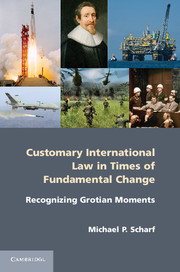Book contents
- Frontmatter
- Contents
- Author’s Biography
- Acknowledgments
- 1 Introduction
- 2 Historical Context
- 3 Theoretical Underpinnings
- 4 Nuremberg
- 5 The Truman Proclamation on the Continental Shelf
- 6 Outer Space Law
- 7 The Yugoslavia Tribunal’s Tadic Decision
- 8 The 1999 NATO Intervention
- 9 The Response to 9/11
- 10 Conclusion
- Index
- References
5 - The Truman Proclamation on the Continental Shelf
Published online by Cambridge University Press: 05 June 2013
- Frontmatter
- Contents
- Author’s Biography
- Acknowledgments
- 1 Introduction
- 2 Historical Context
- 3 Theoretical Underpinnings
- 4 Nuremberg
- 5 The Truman Proclamation on the Continental Shelf
- 6 Outer Space Law
- 7 The Yugoslavia Tribunal’s Tadic Decision
- 8 The 1999 NATO Intervention
- 9 The Response to 9/11
- 10 Conclusion
- Index
- References
Summary
This chapter examines the effect of U.S. President Harry S. Truman’s executive order on September 28, 1945, proclaiming that the resources on the continental shelf contiguous to the United States belonged to the United States. This was a radical departure from the existing approach, under which the two basic principles of the law of the sea had been a narrow strip of coastal waters under the exclusive sovereignty of the coastal state and an unregulated area beyond that known as the high seas. The speed at which Truman’s continental shelf concept was recognized through emulation or acquiescence led Sir Hersch Lauterpacht to declare in 1950 that it represented virtually “instant custom.” This chapter focuses on the confluence of postwar economic needs and technological changes that made this accelerated formation of customary international law concerning the continental shelf possible.
Customary International Law of the Sea prior to the Truman Proclamation
Prior to conclusion of the 1958 Law of the Sea Conventions, this area of law was governed mainly by custom. The Romans considered the seas as res communis – belonging to everyone, and therefore open to use but not appropriation. After the fall of Rome, state practice tended toward an alternate approach, treating the seas as res nullius – belonging to no one, and therefore open to claim. This approach reached its zenith in 1493, when the major powers of the day, Spain and Portugal, purported to divide most of the world’s oceans between them, claiming exclusive navigation rights in a joint act of appropriation ratified by Pope Alexander VI.
- Type
- Chapter
- Information
- Customary International Law in Times of Fundamental ChangeRecognizing Grotian Moments, pp. 107 - 122Publisher: Cambridge University PressPrint publication year: 2013



